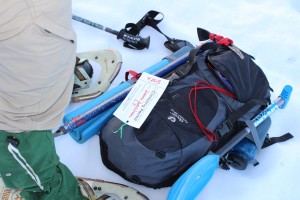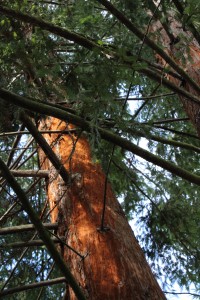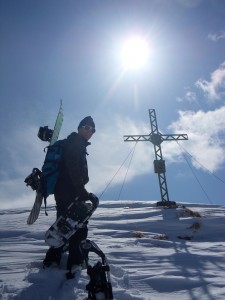I was privileged to attend what I affectionately called “Science Camp” this past May, which was actually a gathering of pastors, theologians, and scientists, brought together for the purpose of discussing the intersection and interrelatedness of our various disciplines. It was one of the great weeks of my career as a pastor as fellowship, stunning creation (via Gulf Island beauty), and intellectual stimulation blended together for a life changing experience.
My theology, though, was challenged profoundly. Having grown up in a conservative Christian environment, I was taught that the Bible is authoritative and is to generally be read literally, unless there are clear reasons for viewing a section as poetry, metaphor, or parable. (I still believe that.) Francis Schaeffer (a sort of theological mentor), especially, fought for the historicity of Genesis 1 and 2, arguing that to believe otherwise was a slippery slope. I remember reading a word of his from somewhere (though I can’t site the exact location), where he said, “If Adam and Eve aren’t historical people in a time and space garden – then how can you know Jesus is a historical person dying on a time and place cross?” Check – and mate! With one word, the historicity of Genesis 1-3 was established as historical fact in my mind, a view reinforced by places like Creation Research Institute.
Not only was this stated positively as fact, but with it came a host of negative declarations towards anyone who believed in evolution. It was, I was told, bad science. It was, I was told, the key to atheism. It was, I was told, the greatest deception ever handed down to humanity.
Over the years my views on this subject “evolved” (pun intended) to a sort of theistic agnosticism with respect to Genesis 1, whereby, when teaching Genesis, I’d present evidence for a young earth, old earth, theistic evolution, and the gap theory – ending with “we really don’t know,” but the important thing is that God created it. I continue to believe that the most important thing is God created it.
And then I read The Language of God by Francis Collins. His science, history, and personal testimony has deconstructed my world. As an atheist, scientist, and leader of the human genome project, Collins came to Christ in a remarkable way whereby the avenues of science, moral law, and the beauty of the Cascade mountains conspired to shout a grand invitation to which he responded. He believes thoroughly in the theory of evolution, believes that the earth is terribly old, and believes that science and the Bible can co-inform each other, that science and faith should work together rather than adversarially. He believes that we can worship God by looking through the lens of a telescope or microscope. I’ve always believed that too, but with a bit of suspicion. Collins, and the science camp experience have given me the freedom, even the obligation, to explore the relationship of science and faith, and so I trust and hope that you will join me in the conversation as offer several blog posts in anticipation of the upcoming sermon series. I need your comments in order to help clarify the issues. Here are my assumptions at the beginning:
1. We need to stop offering a false choice for young people between the life of faith and the life of science. Yet this is precisely what we do when, in the face of overwhelming evidence, we cling to weak science out of a fear that the entire faith enterprise will come tumbling down if the earth is older than 6-10 thousand years. Collins (again, a deeply devoted Christ follower, evangelical Christian) writes: By any reasonable standard, Young Earth Creationism has reached a point of intellectual bankruptcy, both in its science and in its theology.
2. We can take the scriptures at their word. This surely must include Psalm 19, which tells us that the heavens are declaring the glory of God. If these heavens are declaring the glory of God, would they actually lead honest enquirers to believe that God has deceived us, by providing overwhelming evidence for a big bang, and incredible nuances and variations in the cosmos that conspire to create the perfect conditions for sentient life on earth and yet teaching us in His book that the earth is young?
3. The idea of an older earth is older than evolution. None other than St. Augustine believed that the creation narrative stood outside our normal 24 hour days. Further, he warned against prematurely developing dogma in interpretive matters about which we will always, necessarily, have limited knowledge. He writes, “In matters that are so obscure and far beyond our vision, we find in Holy Scripture passages which can be interpreted in very different ways without prejudice to the faith we have received. In such cases, we should not rush in headlong and so firmly take our stand on one side that, if further progress in the search for truth justly undermines this position, we too fall with it.” Yet this is precisely what we do when we make young earth a basic dogma of faith. Pity the student who then is persuaded of other possibilities, for she may will then face the very problem Schaeffer feared above. Linking the historicity of Genesis with the historicity of the resurrection, she may well toss both aside – and that would be a needless tragedy.
4. We’ve played this movie before. The church was fully convinced that Galileo was a heretic because he taught that the earth rotated around the sun. He was excommunicated, his writings banned, and he lived out his days under house arrest. Convinced of one interpretation, the church declared war on science. It’s still happening today.
Oh, and yes, the church finally apologized to Galileo. In 1992. I hope it doesn’t take the creation/evolution debate 500 years to come to a close. With that in, please join the conversation and share, respectfully, your thoughts about why science and faith are so often adversaries, and what can be done address the problem.











